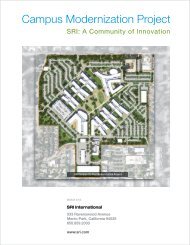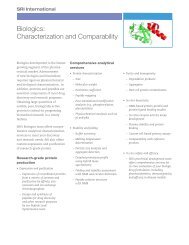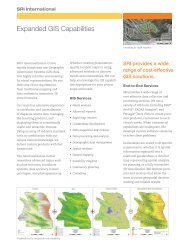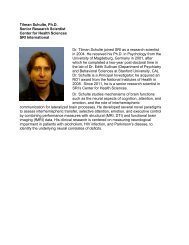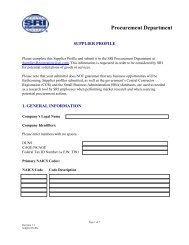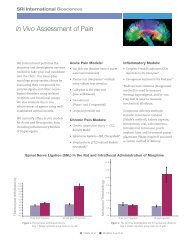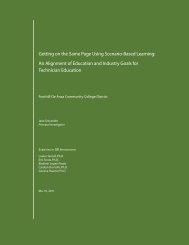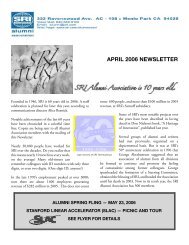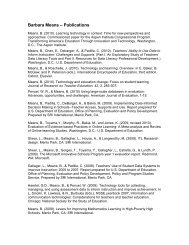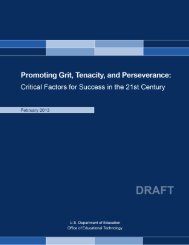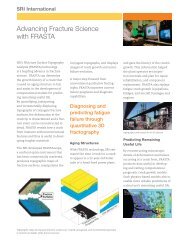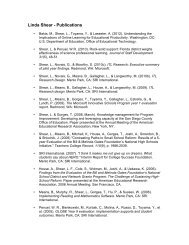Aug 2010 - SRI International
Aug 2010 - SRI International
Aug 2010 - SRI International
You also want an ePaper? Increase the reach of your titles
YUMPU automatically turns print PDFs into web optimized ePapers that Google loves.
<strong>SRI</strong> Alumni Association Newsletter • <strong>Aug</strong>ust <strong>2010</strong><br />
3<br />
What I Have Been Doing in the Three Decades<br />
Since I Left <strong>SRI</strong><br />
By Peter Duncan<br />
INTERNATIONAL JOURNAL<br />
Thank you, <strong>SRI</strong>: first, for the experience of almost 20 years<br />
of employment in a challenging environment; second, for<br />
providing most of the annuity that supports my present<br />
lifestyle; and, third, for setting up the <strong>SRI</strong> Alumni Association<br />
that keeps me in touch with a leader of the changing world<br />
of innovation. Thank you also to my good friends Wilson<br />
(deceased) and Lee Harwood, who contributed so much to<br />
my <strong>SRI</strong> experience. And, finally, thanks to Hoot Gibson and<br />
Ed Robison, whose establishment of the <strong>SRI</strong> <strong>International</strong><br />
Associates Program* led to my journey to Indonesia.<br />
When I left <strong>SRI</strong>, I was living in Jakarta, and I did not wish to<br />
exchange the development chaos of sprawling Indonesia for<br />
life in compact and orderly Singapore. So I continued to live<br />
and work in Jakarta, first as an independent consultant and<br />
later as an associate of CastleAsia (www.castleasia.com), the<br />
leading business consultancy in this then newly emerging<br />
country with the world’s fifth-largest population. My<br />
fascination with Indonesia’s politics, economics, and society<br />
continued while I worked as a development economist on<br />
a wide variety of projects. These projects were seriously<br />
disrupted by the South East Asia monetary crisis of 1988,<br />
which caused a 30% drop in the value of the Indonesian<br />
Rupiah and the fall of President Suharto.<br />
I stayed on after the crisis, living in a stylish villa in the<br />
cool hills above Jakarta while scraping for business with little<br />
success and trying to keep a polo club going at the Jagorawi<br />
Golf & Country Club. This situation was not sustainable.<br />
Forced at last to face reality, and without wife and offspring<br />
to deter me and against the advice of my friends, about<br />
2 years ago I talked myself into leaving Indonesia and<br />
tackling my final folly of taking over a virtually bankrupt<br />
resort company in the tea country above Kandy in Sri Lanka.<br />
This company, WildFlower Hall Lanka (Pvt) Ltd (WFHL),<br />
is my retirement project. It was established 11 years ago as<br />
an aromatherapy spa. I am trying to convert it into an ecofriendly<br />
agroforestry holiday resort.<br />
This task requires me to learn new skills ranging from<br />
guiding building renovation and guest house management<br />
through land use planning and no-till farming to my<br />
latest green enthusiasms, wind and mini-hydro energy<br />
and Food4Wealth. WFHL has 26 acres of leased land at<br />
just over 3,000-foot altitude. It is mostly steep abandoned<br />
Great Valley, Sri Lanka<br />
Peter at WFHL<br />
tea plantation with depleted acidic soils. Its baronial hall<br />
overlooks spectacular views of the township of Deltota,<br />
Great Valley farmland, and the mountains beyond. I am<br />
thinking of promoting visitors with the slogan “Take a<br />
Break from Luxury and Tourist Sites.” Its 15 rooms include<br />
5 comfortable guest bedrooms and 2 large reception and<br />
activity rooms, and it has capacity for up to 30 guests in<br />
shared and dormitory accommodations. Activities for guests<br />
include enjoying the view and the cool, bracing air; walks<br />
around the tea and foliage gardens and up to the pine forest;<br />
and excursions to Kandy city and the historic Loolecondera<br />
pioneer tea plantation. In short, I am continuing my<br />
two overriding interests—in developing countries and in<br />
economic research—but this time at the do-it-yourself level.<br />
The current status of my project is that, having passed<br />
on the aromatherapy business to a third party, I am now<br />
free to concentrate on green agroforestry, herb and foliage<br />
production, and no-till farming. Thanks to good rains since<br />
May, I have Glyricidia hedges and shade trees protecting<br />
China grass and Cordyline foliage, landscaping, and<br />
fruit trees growing and have made a stumbling start with<br />
strawberries, forage grasses, lavender, pepper, and other<br />
herbs. I will be planting citrus and dragon fruit this week—a<br />
really motley collection at this stage as I am trying to keep to<br />
a tight budget while I go through the learning process. The<br />
Internet is my ever-helpful adviser, and Sri Lankans I meet<br />
of all communities are generous with advice. I was lucky<br />
to get started just before the 30-year Tamil Tigers rebellion<br />
came to an end, starting, as widely expected, a new era of<br />
progress for this country full of surprises.<br />
*See Chapter 13, “The World of Business and Economics,” in A Heritage<br />
of Innovation: <strong>SRI</strong>’s First Half Century by Donald L. Nielson.



